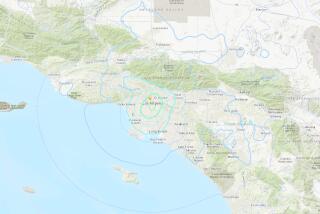Effect of Jerusalem Quake Is Political, but Not Biblical
- Share via
JERUSALEM — Down through the millenniums, earthquakes in and around this holy city have been the stuff of apocalyptic prophecies and mystical revelations, viewed as divine punishment or portents of upheaval.
But Wednesday, when a magnitude 5.1 quake rumbled through the city, the modern reality was a bit more mundane: cracked walls and ceilings, lots of excited talk in Internet chat rooms, and early school closures that sent Israeli and Palestinian parents scrambling.
No deaths, serious injuries or major damage were reported in the wake of the sharp temblor, which struck just before 10:30 a.m. But the quake, with its epicenter in the Judean desert at the northern tip of the Dead Sea, was felt the length and breadth of Israel and the Palestinian territories, as well as in Syria, Lebanon, Egypt and Jordan.
Pots and pans rattled in army mess halls. Skyscrapers swayed. Mosque minarets shook and church bells chimed. People fled office buildings and shopping malls.
And even before the shaking stopped, the temblor -- like almost everything that happens in this part of the world -- had taken on a political dimension.
At Palestinian leader Yasser Arafat’s half-ruined headquarters in the West Bank city of Ramallah, aides at first thought Israeli warplanes were attacking. In the committee rooms of Israel’s Knesset, or parliament, lawmakers initially suspected that a massive car bomb had been set off nearby.
Some Jewish settlers speculated that the quake was a heaven-sent warning to Israeli Prime Minister Ariel Sharon -- resting up after a bout with kidney stones -- not to move ahead with a recently unveiled proposal to uproot Jewish settlements in the Gaza Strip.
Many on both sides of the Israeli-Palestinian divide were united by the sentiment that day-to-day life was already sufficiently eventful without any seismic occurrences.
“I thought to myself: This is just what we need,” an Israeli woman named Hana complained in an online gabfest that sprang up on the website of the Yediot Aharonot newspaper. “We have terror, unemployment, corrupt leaders, strikes and now -- what were we missing? -- an earthquake.”
Devastating earthquakes have rocked the region since antiquity, some of them recorded in the Bible and discerned through archeological evidence. A quake figured in the Crucifixion, according to Gospel accounts. The biblical Zachariah prophesied that Jerusalem’s Mount of Olives would be cleft in two by a temblor. A great earthquake and a sun “black as sackcloth” figure in the Book of Revelation.
It was probably an earthquake, rather than the sound of trumpets, that destroyed the walls of biblical Jericho, said Amos Nur, a professor of geophysics at Stanford University who has tracked the Holy Land’s seismic history. The Dead Sea Scrolls were preserved in what were probably quake-sealed caves. Biblical accounts of the River Jordan ceasing to flow after a quake were probably true, Nur said in a telephone interview Wednesday, because a strong temblor would have caused its soft mud banks to collapse.
In more recent times, a 1927 quake of magnitude 6.2 killed hundreds and wrecked buildings in half a dozen cities.
Last month, experts warned that the region could be ripe for a serious quake and that Jerusalem’s Old City, with its plethora of disputed holy sites, was at particular risk because it was built on centuries’ worth of unstable rubble and debris.
After Wednesday’s jolt, two often-sparring members of parliament -- Ahmed Tibi, an Israeli Arab, and Yisrael Eichler, an ultra-Orthodox Jew -- reacted.
“I have no doubt that Sharon will blame this on the Palestinian Authority and try to expel Arafat,” Tibi joked, according to Israeli media accounts.
Eichler was more somber.
“In Iran only recently, many thousands died,” he said. “We in the land of Israel must understand we were spared by a miracle today.”
More to Read
Sign up for Essential California
The most important California stories and recommendations in your inbox every morning.
You may occasionally receive promotional content from the Los Angeles Times.










